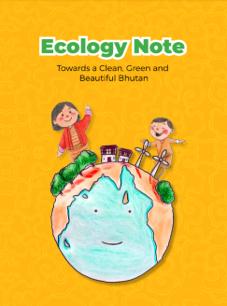In order to address and respond to emerging environmental issues, it is important to encourage all stakeholders to take responsible and collaborative actions through education including awareness raising and capacity development. In the field of waste management, education plays a critical roles to establish the 3Rs (reduce, reuse and recycle) practices and more sustainable consumption patterns to prevent waste generation and achieve proper waste management. Especially, it is important to empower the young generation through environmental education to take responsible decision and actions from the early stage of life. Therefore, alongside providing support for proper waste management, CCET has been helping develop environmental education programs and materials for the partner countries in Asia including Myanmar, Cambodia and Bhutan.
In this context, CCET’s educational material “Ecology Note” was adopted to nationwide Bhutanese elementary schools on the request of the National Environment Commission (NEC) Bhutan based on the local context of the country including their daily custom, lifestyle, and Gross National Happiness (GNH).
Based on CCET’s experience in waste management, Ecology Note was designed to provide opportunities to develop a sense of ownership and responsibility, and aims at fostering the ability to identify and analyse the issues, find the optimal solution through employing collaborative and self-motivated activities such as exploration, discussion, and presentation with the underlying concept of active learning approach. The booklet also supports to deepen student’s understanding on sustainable waste and resource management topics including waste prevention, composting, and 3Rs in general.
In this webinar, the presentation and discussion will focus on 1) how environmental education can be designed by the government and city, 2) how it can be effectively implemented through active learning approach toward making critical actions and transformation for sustainable development, and 3) how international cooperation and mutual learning among countries and cities can enhance meaningful education approach.
新たな環境問題に主体的に対応するためには、意識向上や能力開発などの教育を通じて、すべてのステークホルダーによる責任ある協調的な行動を促すことが不可欠です。廃棄物管理の分野においては、廃棄物の発生を防ぎ、3R(リデュース、リユース、リサイクル)の実践とより持続可能な消費行動を確立するためにも教育が大きな役割を果たします。特に、若い世代の適切な決断および行動に有用な環境教育の提供が重要です。CCETは、廃棄物の適切な管理を支援すると同時に、ミャンマー、カンボジア、ブータンなどのアジアのパートナー国にて、環境教育プログラムおよび教材の開発を支援してきました。
その一環として、ブータンの国家環境委員会(NEC)の要請により、CCETは「エコロジーノート」の作成を支援し、この環境教育教材は、ブータン全土の小学校に採用されました。
エコロジーノートは、CCETの廃棄物管理の経験を踏まえて、当事者意識と責任感を育む機会を提供すべく構成しています。能動的学習アプローチに基づき、探索・議論・発表などの協力的かつ自発的な活動を通じて、問題を特定・分析し、最適な解決策を見出す能力の育成を目的とし、さらに、廃棄物防止、コンポスト、3Rなど、持続可能な廃棄物・資源管理に関する理解を深めることも目指しています。
このウェビナーでは、1)政府ないし都市が環境教育をいかにデザインできるか、2)持続可能な開発に向けた重要な行動や変化のための効果的なアクティブラーニング実施方法、3)国ないし都市間の国際協力による有意義な教育アプローチ強化、に焦点を当ててプレゼンテーションおよびディスカッションを行います。

